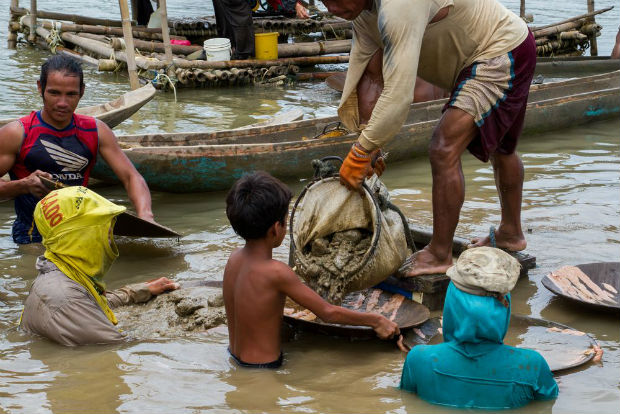Child labor: The Devil’s work
Cynthia, Pedro, and Luis, are you old enough to work?
Twelve-year-old kids are allowed in Egypt and Senegal for seasonal work, and in Benin for light agriculture. Thirteen-year-olds are allowed to work in Denmark as shop assistants, in Tunisia and Switzerland for light non-industrial labor.
A 14-year-old is permitted by law in Cyprus for construction, in India and Sri Lanka for street trades. A 15-year-old child is permitted to work in Thailand in bars, and in Dominican Republic in mining.
In 1992, the employment of Filipino children below 15 years old was made both illegal and unethical, courtesy of RA 7610 and RA 7658. As expected, Shell Philippines, Caltex, Total, and Petron ceased hiring kids as gasoline boys and promised to eradicate the disgraceful phenomenon in the oil business.
However, Doubting Thomases persist to ask – and with a valid reason, of course – how does the Department of Labor enforce this law in favor of Boyet, Isagani, and Cristina, when it cannot even enforce the law for employers to remit SSS and pay correct wages and other benefits to their parents?
Filipino kids still working in the new millennium
Did we just launch The Philippine Program Against Child Labor 2017-2022 that aims to rescue one million Filipino children from child labor? Mario, Abigail, and Joel raised their hands into the air to celebrate.
Is the Philippines a worthy signatory to the United Nations Convention on the Rights of the Child? How come that, with enough laws against child labor, we can still find the most shameful forms of child labor in every nook and corner of our beloved Motherland?
Did ILO Convention No. 182 clearly define the evil of child labor and sharply pointed to small scale mining as one of the deadliest forms of employment?
Yet, in our small-scale mines, the daily survival acts of Toto, Joel, and Dante carrying heavy sacks of rocks, fetching clean water, loading the thick logs used to support the underground tunnels, or running errands for regular workers form a part of the dirtiest landscape of rural poverty.
Yet, our Filipino kids as young as 5 years are still working, some of whom are given daily dosage of cheap performance-enhancing drugs so that they could withstand 16 hours of work in the mining pits. Related research-based fact-finding narratives are easily accessible and available on YouTube and google.
As long as poverty widens and greed corrupts the souls
Why do 5,000,000 of our kids continue to work, completely stop going to school – up from 4,000,000 in 2001 – and are unable to escape from this vicious cycle?
Why do 2,100,000 Filipino children still take on hazardous work, repeatedly exposed to extreme weather, poor working conditions, and long working hours while using substandard tools and crude equipment or, for those working in shit-hole chemical factories, using their bare hands without gloves and without face masks?
Why do they at an early age offer themselves for (or are forced into) prostitution, pornography, or lewd performances?
Meet Laura, Clara, and Diego who live in extreme poverty. “Mahirap lang po ang tatay at nanay ko” (My parents are poor) and so, fundamentally, they are forced to work in order to supplement the family’s meager income.
In the urban centers, the phenomena of street children and child labor are the twin offspring of lady poverty. The most pressing act of the day is for parents and kids to earn a living in order to make both ends meet.
Even the lowest payments in cash or in kind are a welcome relief to the poverty-stricken families where these Gigi, Boy, and Lorenzo belong.
Distorted values and beliefs
Regrettably, the poor parents of David, Nelson, and Juana believe that the kids must help to pay debts and support the family. So, Kiko, Jun, and Maria are sacrificed at a tender age as they send their siblings to school while they ironically stay out of school.
The unhappy story of teenager Sarah Balabagan comes back to mind. Parents Bai and Karim Balabagan allowed their adolescent-daughter Sarah to work as a domestic helper in the United Arab Emirates.
At the tender age of 14, Sarah, already the breadwinner in the family, suffered in jail from 1994-1996 after stabbing and killing her elderly employer who tried to rape her.
During the height of her ordeal, the father expressed the low-life wish (I couldn’t believe it) that Sarah be freed so she could earn for the family again.
Dear Filipino bosses, the kids are physically deteriorating, mentally wasting, morally decaying, and lowly aspiring. Of course, Omar, Kim, and Shiela have the same human dignity and are endowed too with basic human rights like you and me.
Never forget that child labor is not only a crime, but also an immoral act. The crime is committed against the nobility of humankind and the immoral act is committed against YHWH God, who forewarned you: “See that you do not despise one of these little ones” (Matthew 18:10).
Filipino kids, still working? Your angel in Heaven covers her face in utter shame as the Devil’s laughter is heard everywhere in Hell.
Jose Mario Bautista Maximiano is a pioneer of CSR and Business Ethics education in the Philippines, author of Pope Francis, the Catholic Bishop, and the Priest (2015) and The Church Can Handle the Truth (2017). Comments to jomaximiano@gmail.com.


